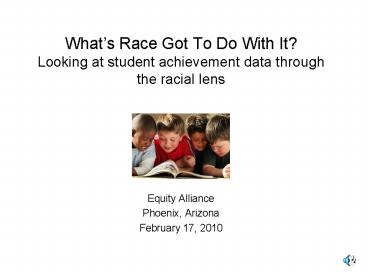What - PowerPoint PPT Presentation
1 / 19
Title:
What
Description:
Title: Culturally Competent Instructional Strategies and Elimination of the Learning Gap Author: adell cothorne Last modified by: MCPS Created Date – PowerPoint PPT presentation
Number of Views:105
Avg rating:3.0/5.0
Title: What
1
Whats Race Got To Do With It?Looking at student
achievement data through the racial lens
- Equity Alliance
- Phoenix, Arizona
- February 17, 2010
2
Session Outcome
- Participants will be able to
- Use research-based practices to engage school
districts/school communities/grade level teams in
the interpretation of standardized and classroom
data to improve instructional practices.
3
Heres what today will look like Personal
Cultural HistoryData Analysis through the
racial lensQ and A
4
Personal Cultural History
5
Choose 3
- Race
- Region
- Religion
- Gender
- Language
- Age
- Socioeconomic Status
6
Data helps us to do many things in schools
understand where we are, define where we want and
need to go, and measure progress along the
way. (Holcomb, 2004, p. xv)
7
MSA Proficiency Levels Grade 3 Mathematics
Everybody Achieves ES Everybody Achieves ES Everybody Achieves ES Everybody Achieves ES
Advanced 19.4 23.7 24.8
Proficient 55.3 57.7 54.8
Basic 25.3 18.6 20.4
2007 2008 2009
8
MSA Proficiency Levels Grade 3 Mathematics
9
MSA Proficiency Levels Grade 3 Mathematics
10
MSA Proficiency Levels Grade 3 Mathematics
Advanced Proficient Basic
Hispanic 6/31 18/31 7/31
African American 5/25 13/25 7/25
White 15/35 17/35 3/35
Asian 1/4 2/4 1/4
11
Who Needs to Move?
Hispanic 18/31 Rosa
African American 13/25 Jamal
White 3/35 David
Asian 1/4 Tina
12
Leaders must come to grips with the reality that
there are some staff members reluctant to use
data
Lack of proper training and/or time
Feast or famine
Fear of evaluation and/or exposure
Confusing a technical problem with a cultural
problem
13
Session Outcome
- Participants will be able to
- Use research-based practices to engage school
districts/school communities/grade level teams in
the interpretation of standardized and classroom
data to improve instructional practices.
14
The Golden Question
15
How do I get started?
First, examine your own beliefs about students
academic potential.
Next, help your school community face its
problems and come up with a strategic plan of how
to address each problem. PRIORITIZE!
Finally, make the consistent use of disaggregated
data a non-negotiable for your entire school
community.
16
- The key here is not the kind of instruction but
the attitude underlying it. When teachers do not
understand the potential of the students they
teach, they will underteach them no matter what
the methodology. - Lisa Delpit, author of Other Peoples Children
17
(No Transcript)
18
Questions
19
Resources
- Bernhardt, V. (2004). Data analysis for
continuous school improvement. New York Eye on
Education. - Gay, G. (2000). Culturally responsive teaching
Theory, research and practice. New York Teachers
College Press. - Holcomb, E. (2004). Getting excited about data
Combining people, passion, and proof to maximize
student achievement. California Corwin Press. - Lindsey, R.B., Roberts, L. M., CampbellJones, F.
(2005). The Culturally Proficient School An
implementation guide for school leaders.
Thousand Oaks, CA Corwin Press.































